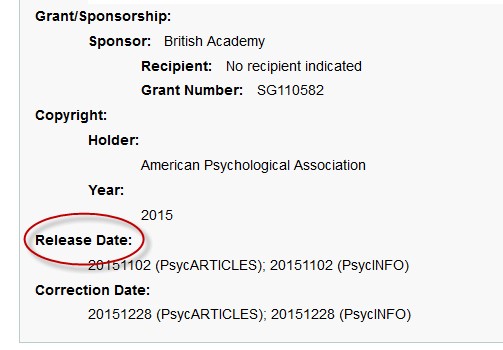Do you use the Grant/Sponsorship field in PsycINFO? This field displays the funding sources that the authors include in their acknowledgements. The Grant/Sponsorship field will capture data about grant funding, but you’ll also see information on fellowships, scholarships, departmental awards, and more – any type of funding source that the authors acknowledge. Take a look at the variety of funding acknowledged here:

The Grant/Sponsorship field from a PsycINFO record, shown here on APA PsycNET.
The Grant/Sponsorship field is divided into four sub-fields: Sponsor, Recipient, Grant Number, and Other Details. You’ll always see the Sponsor and Recipient sub-fields, even if the authors didn’t indicate who the sponsor was (though they almost always provide this information) or who was the named recipient of the funding. If the authors provide the grant number, we include that in a separate sub-field. Any other information about the funding source is added to the Other Details sub-field. This can run the gamut from the name of a scholarship to the name of a large-scale research initiative.
All four of these sub-fields may be searched by choosing the Grant/Sponsorship option. For example, try searching PsycINFO for your institution, or for a grant number (try KZCC-EW-103-2).

Searching PsycINFO, via APA PsycNET, for the grant number.
Why provide this information? It’s one more detail that we believe can be helpful in working with PsycINFO. Instructors can use the information to open a conversation about bias in research with their class; it can also be used as a source of ideas for researchers who are seeking funding, looking for collaborators, or want to find out if the funder was a government agency or commercial entity.
You won’t see the Grant/Sponsorship field on every record in PsycINFO, as we didn’t begin collecting this information until 2005. And of course, not everything indexed in the database includes funding acknowledgements.
Related Resources:




